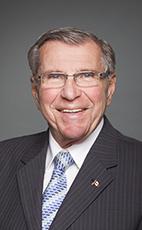Madam Speaker, I arrived here a very fortunate man 12 years ago, elected by the electors of Stormont—Dundas—South Glengarry. I really believe that since that time this is probably the most complex and sensitive issue I have ever witnessed come before Parliament, for me personally anyhow.
As far as disclosure goes, I am a practising Catholic. As a result of that, I will definitely be voting against Bill C-14. For me, this is a moral issue. I strongly believe in the sanctity of life. In fact, ever since I can remember, I have taught that life is precious, especially a human life, but also an animal or an insect's life. All through my life I have been taught that life is a gift from God and we should respect it as such.
That is not the only reason I will be voting against Bill C-14. Because this is such an important issue, I thought I should get input from my constituents. I took the trouble of sending a survey to 45,000 homes in my riding. The results were: 65% of the constituents of Stormont—Dundas—South Glengarry were against Bill C-14, and 35% were in favour of the bill, with conditions. I read many of the comments of the 35% and those conditions were rather strict. They called for very limited assisted dying.
I want to thank the joint committee. I wish I had been on the committee, but in other respects I am glad I was not. It must have been a very emotional committee on which to serve. I want to thank all the members for the hard work they put into it, especially the members of the Conservative Party, because they issued a dissenting report. Thank God for that dissenting report.
I must give the government credit for accepting some of the issues included in the dissenting report. They were things like limiting it to competent adults 18 or over. That is so important. If we are to have this legislation, at least we should have that as one of the criteria. The other one was safeguards for vulnerable persons. My colleague, the member for Brantford—Brant, spoke about that. He has a son who is in that category. There was also protection for physicians who disagreed. I have had so many physicians in my riding say that they cannot support this and believe they will be in trouble if they do not support it.
As many of my colleagues said, we have to do this. The Supreme Court of Canada has told us we must. However, if we must do it, let us minimize the damage. There is a way to do that. It is called palliative care.
During the campaign, the Liberal Party promised $3 billion for long-term care, including palliative care. However, in the budget, as my colleagues have stated, there was no hint of any money for long-term care and certainly no money for palliative care. It is nowhere to be found in the budget.
The special joint committee and most of the stakeholders who appeared before it, including the Canadian Medical Association, spoke of the need for a pan-Canadian strategy on palliative care, with dedicated funding. They suggested that there be dedicated funding for palliative care if we were to enact Bill C-14.
My Liberal colleagues are in the House. They are going to have a caucus meeting tomorrow, as will we. Money for palliative care should be brought up at that meeting.
I spoke with the manager of the Cornwall hospice today. Cornwall hospice is in my riding. About eight to ten years ago the community came together. We thought we needed a hospice so we raised funds. Now we have a wonderful 10-bed facility that deals with 100 to 150 patients per year.
I had heard through the grapevine, and through reading, that sometimes people left palliative care. I called the manager of this hospice directly and asked if this had ever happened. He said, “most definitely”.
On average, three to four people leave palliative care in a year. Sometimes they are gone for 6 month to 24 months. Imagine if some of those people had chosen the route of Bill C-14.
I was doing some reading on this issue, and it really struck a chord in my heart. I would like to quote something that I read, which is from the Euthanasia Prevention Coalition. It says:
Yet of the millions of mis-diagnoses every year, many are terminal mis-diagnoses. We know this because of the thousands of people who “graduate” from hospice each year.
People leave hospices not only in Cornwall, but right across North America and the world. There are so many examples of people outliving terminal prognosis, from Ted Kennedy living a year longer than predicted, to John Norton from Florence, Massachusetts, who testified before the state legislature. When he was diagnosed with ALS, he would have definitely used assisted suicide were it available. Luckily for John, his family, and everyone who has come to know him, assisted suicide was not state policy. He went into remission, and 60 years later he is urging people to reject assisted suicide. I rest my case.

